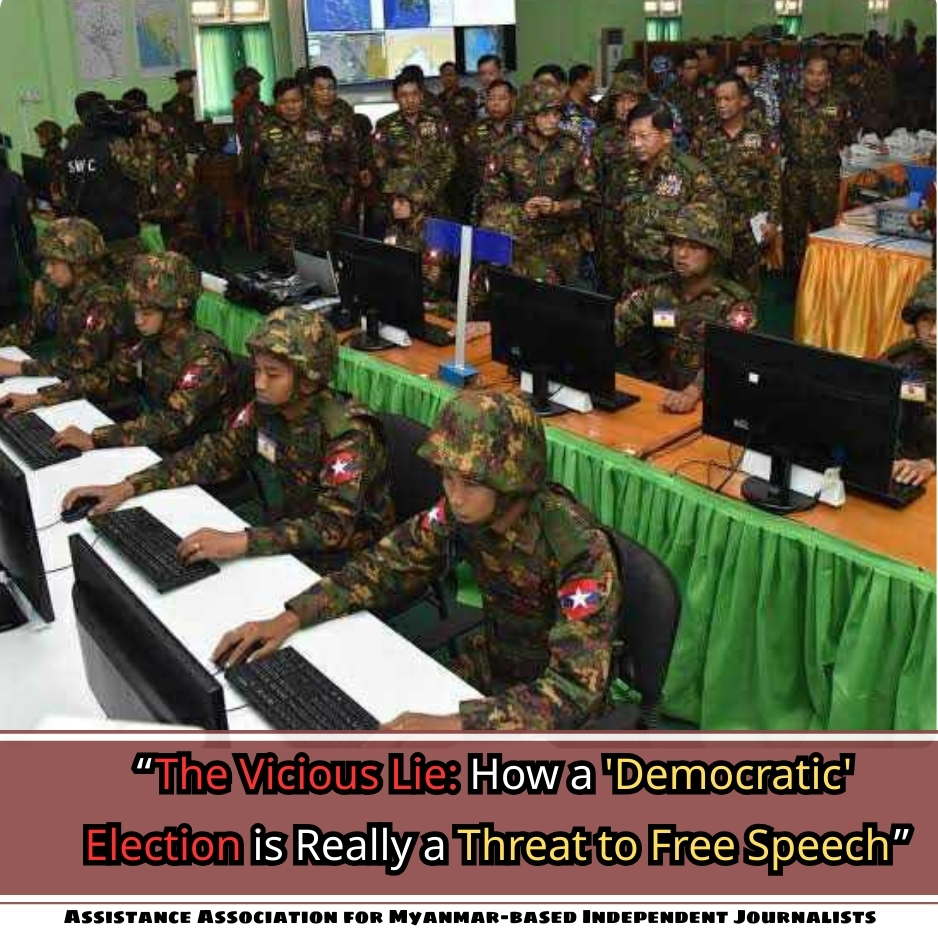By Elliot Fletcher
The Myanmar junta’s new gag law and suppression of political opposition ensure this is a vote without a choice.
Following the revocation of the national state of emergency by Myanmar’s National Defence and Security Council (NDSC) on 31 July 2025, the State Administration Council (SAC) government rebranded itself as the State Security and Peace Commission (SSPC), framing the latter as an ‘interim government’ that pro-democracy, intergovernmental organisation International IDEA describes as ‘almost identical to the SAC’. In doing so, the military junta, having governed Myanmar illegitimately in a seven-times-extended state of emergency since their February 2021 coup d’état, promised free elections that will take place in stages from December 2025 to January 2026. These will be supervised by the SSPC.
’Despite the junta’s claims of working toward a “genuine, disciplined multiparty democratic system, human rights groups have denounced the promise of free elections as an “illegitimate” sham, claiming that the elections will be a “strategic repackaging of military rule”.
On February 5, 2021, just days after the military coup, elected representatives from the National League for Democracy (NLD) and other ethnic parties formed the “Committee Representing Pyidaungsu Hluttaw (CRPH)” to serve as the country’s legitimate government.
The CRPH has since formed a government in exile, the National Unity Government (NUG). The NUG has been recognised by the European Union and the International Trade Union Confederation as the legitimate government of Myanmar. Although the UN has not formally recognised the NUG as the government of Myanmar, the junta was barred from sending representatives to the General Assembly; Kyaw Moe Tun, a diplomat representing the NUG, was instead recognised as the legitimate representative of Myanmar to the UN, a large political win.
International IDEA claims that the upcoming December elections are a “calculated attempt to undermine Myanmar’s legitimate government,” the NUG, and aim to give the junta an appearance of adhering to democratic processes.
According to the latest report on September 2, 2025, from the UN human rights office, OHCHR, between the February 2021 coup and August 20, 2025, the Myanmar military has killed approximately 7,100 people, with roughly one-third of the victims being women and children. The military has also arrested at least 29,560 people for political reasons, and over 22,000 of them remain in detention without fair trials in military-controlled courts.
There has been a systematic violation of human rights, with repeated allegations of torture experienced by those in military custody. James Rodehaver, the head of the OHCHR Myanmar team, lists the following as methods employed:
“The introduction of animals such as snakes or insects or other wild animals in order to provoke fear and terror in individuals. Beating people with iron poles, bamboo sticks, batons, rifle butts, leather strips, electric wires, motorcycle chains, asphyxiation, mock executions, electrocution and burning with tasers, lighters, cigarettes and boiling water”.
It would be impossible to hold a representative vote because the junta doesn’t control the entire country; large areas are under the control of the People’s Defense Force (PDF) and other armed ethnic resistance groups. In the eastern Rakhine state, for example, almost all territory is controlled by the Arakan Army, one of the larger ethnic armed forces. Myanmar is a member of the Inter-Parliamentary Union (IPU) which, in its Declaration on Criteria for Free and Fair Elections, asserts that ‘every voter has the right to equal and effective access to a polling station in order to exercise his or her right to vote’. If the SSPC can’t ensure that every eligible citizen under the constitution can vote, the election that has been proposed is, by definition, neither ‘free’ nor ‘fair’.
Another clause of the IPU’s Declaration states that every citizen “‘has the right to express political opinions without interference”. The junta has recently enacted the new “Law on the Protection of Multiparty Democratic General Elections from Obstruction, Disruption, and Destruction” that forbids “any speech, organising, inciting, protesting or distributing leaflets in order to destroy a part of the electoral process,” outlawing any criticism of the election, its processes, and, by extension, the junta itself. The statute mandates three-to-seven-year prison sentences for those who disobey it. A man from Taunggyi, identified as Ko Nay Thway, was arrested on August 24 for allegedly posting on social media to sabotage the upcoming elections. He has been charged under the new Election Protection Law.
Alongside the new election protection regulation, it has also imposed harsh cybersecurity laws, which human rights groups mentioned as “decree” that criminalise the setting up the servers of VPNs and prevent sharing information on social media sites (Facebook, Instagram, WhatsApp, X, and independent media websites are amongst those banned or restricted), allowing yet another basis for the junta to silence journalists.
This tactic mirrors Putin’s Russia, which has a law criminalising ‘discrediting’ the government or the military as per Article 280.3 of its criminal code. In Russia, their law has been used to suppress dissent around election – what can be inevitably expected of Myanmar as well. Similar echoes are evident in Thailand and Cambodia’s lèse-majesté laws. All these countries have faced authoritarian regimes, whose elections are not classified as ‘free,’ thereby limiting the human right of freedom of expression in one way or another.
It is a frequently used tactic of Min Aung Hlaing’s regime to find any legal basis to quash political enemies. When the NLD’s democratically elected government was overthrown by the Tatmadaw military, State Councillor Aung San Suu Kyi was ousted from power. She was arrested on the pretence that she illegally imported walkie-talkies and broke COVID rules, initially losing her position and being doled a 4-year prison sentence under house arrest. The 78-year-old’s sentence was inflated further to 33 years and then dropped to 27. The prosecution was unlikely based on her actual ‘crimes’, but rather on the aim to remove her from power. It is highly likely that the junta would employ these same tactics in tandem with its new gag law if any real political alternative was to emerge before the elections.
Most of the country’s pro-democratic lawmakers and politicians have either been arrested or have left the country, leaving the people with no real option other than to vote for proxy parties of the junta. The new gag laws and regulations like the ones mentioned above are preventing criticism of the junta (and the elections themselves) and limit the crucial right to freedom of expression. In the past, the junta has employed backhanded tactics to silence political opposition and dissent – they are not above bending the rules to keep power, as shown by their transfer from the SAC to the SSPC as a repackaging of the same government. There is no question that this election is not free. Freedom of expression is and will be limited in this power struggle, a face-saving measure for an authoritarian regime.
Elliot Fletcher is a contributing independent journalist. He is based in both South East Asia and in the UK, covering human rights issues and international law

